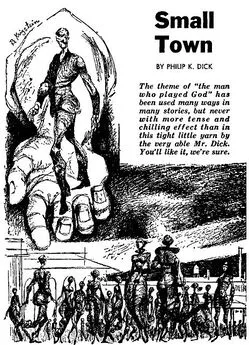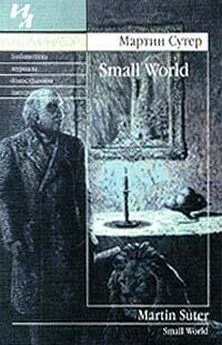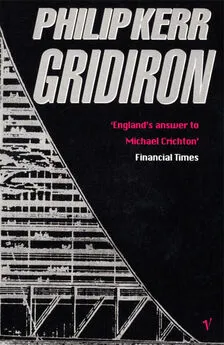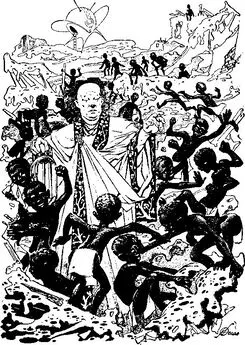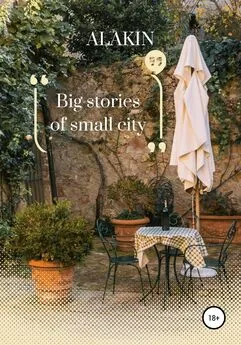Philip Dick - Small Town
- Название:Small Town
- Автор:
- Жанр:
- Издательство:неизвестно
- Год:неизвестен
- ISBN:нет данных
- Рейтинг:
- Избранное:Добавить в избранное
-
Отзывы:
-
Ваша оценка:
Philip Dick - Small Town краткое содержание
Small Town - читать онлайн бесплатно полную версию (весь текст целиком)
Интервал:
Закладка:
Small Town
BY PHILIP K. DICK
VERNE HASKEL crept miserably up the front steps of his house, his overcoat dragging behind him. He was tired. Tired and discouraged. And his feet ached.
“My God,” Madge exclaimed, as he closed the door and peeled off his coat and hat. “You home already ?”
Haskel dumped his briefcase and began untying his shoes. His body sagged. His face was drawn and gray. “Say something!”
“Dinner ready?”
“No, dinner isn't ready. What's wrong this time? Another fight with Larson?” Haskel stumped into the kitchen and filled a glass with warm water and soda. “Let's move,” he said.
“Move?”
“Away from Woodland. To San Francisco. Anywhere.” Haskel drank his soda, his middle-aged flabby body supported by the gleaming sink. “I feel lousy. Maybe I ought to see Doc Barnes again. I wish this was Friday and tomorrow was Saturday.” “What do you want for dinner?”
“Nothing. I don't know.”

Haskel shook his head wearily. “Anything.” He sank down at the kitchen table. “All I want is rest. Open a can of stew. Pork and beans. Anything.”
“I suggest we go out to Don’s Steakhouse. On Monday they have good sirloin.” “No. I’ve seen enough human faces today.”
“I suppose you’re too tired to drive me over to Helen Grant’s.”
“The car’s in the garage. Busted again.”
“If you took better care of it—”
“What the hell you want me to do? Carry it around in a cellophane bag?”
“Don’t shout at me, Verne Haskel!” Madge flushed with anger. “Maybe you want to fix your own dinner.”
Haskel got wearily to his feet. He shuffled toward the cellar door. “I’ll see you.” “Where are you going?” “Downstairs in the basement.”
“Oh, Lord!” Madge cried wildly. “Those trains! Those toys! How can a grown man, a middle-aged man—”
Haskel said nothing. He was already half way down the stairs, feeling around for the basement light.
The basement was cool and
moist. Haskel took his engineer’s cap from the hook and fitted it on his head. Excitement and a faint surge of renewed energy filled his tired body. He approached the great plywood table with eager steps.
Tracks ran everywhere. Along the floor, under the coal bin, among the steam pipes of the furnace. The tracks converged at the table, rising up on carefully graded ramps. The table itself was littered with transformers and signals and switches and heaps of equipment and wiring. And—
And the town.
The detailed, painfully accurate model of Woodland. Every tree and house, every store and building and street and fireplug. A minute town, each facet in perfect order. Constructed with elaborate care throughout the years. As long as he could remember. Since he was a kid, building and glueing and working after school.
Haskel turned on the main transformer. All along the track signal lights glowed. He fed power to the heavy Lionel engine parked with its load of freight cars. The engine sped smoothly into life, gliding along the track. A flashing dark projectile of metal that made his breath catch in his throat. He opened an electric switch and the engine headed down the ramp, through a tunnel and off the table. It raced under the work bench.
His trains. And his town. Haskel bent over the miniature houses and streets, his heart glowing with pride. He had built it—himself. Every inch. Every perfect inch. The whole town. He touched the corner of Fred’s Grocery Store. Not a detail lacking. Even the windows. The displays of food. The signs. The counters.
The Uptown Hotel. He ran his hand over its flat roof. The sofas and chairs in the lobby. He could see them through the window.
Green’s Drugstore. Bunion pad displays. Magazines. Frazier’s Auto Parts. Mexico City Dining. Sharpstein’s Apparel. Bob’s Liquor Store. Ace Billiard Parlor.
The whole town. He ran his hands over it. He had built it: the town was his.
The train came rushing back, out from under the workbench. Its wheels passed over an automatic switch and a drawbridge lowered itself obediently. The train swept over and beyond, dragging its cars behind it.
Haskel turned up the power. The train gained speed. Its whistle sounded. It turned a sharp curve and grated across a cross-track. More speed. Haskel’s hands jerked convulsively at the transformer. The train leaped and shot ahead. It swayed and bucked as it shot around a curve. The transformer was turned up to maximum. The train was a clattering blur of speed, rushing along the track, across bridges and switches, behind the big pipes of the floor furnace.
It disappeared into the coal bin. A moment later it swept out the other side, rocking wildly.
Haskel slowed the train down. He was breathing hard, his chest rising painfully. He sat down on the stool by the workbench and lit a cigarette with shaking fingers.
The train, the model town, gave him a strange feeling. It was hard to explain. He had always loved trains, model engines and signals and buildings. Since he was a little kid, maybe six or seven. His father had given him his first train. An engine and a few pieces of track. An old wind-up train. When he was nine he got his first real electric train. And two switches.
He added to it, year after year. Track, engines, switches, cars, signals. More powerful transformers. And the beginnings of the town.
He had built the town up carefully. Piece by piece. First, when he was in junior high, a model of the Southern Pacific Depot. Then the taxi stand next door. The cafe where the drivers ate. Broad Street.
And so on. More and more. Houses, buildings, stores. A whole town, growing under his hands, as the years went by. Every afternoon he came home from school and worked. Glued and cut and painted and sawed.
Now it was virtually complete. Almost done. He was forty-three years old and the town was almost done.
Haskel moved around the big plywood table, his hands extended reverently. He touched a miniature store here and there. The flower shop. The theater. The Telephone Company. Larson’s Pump and Valve Works.
That, too. Where he worked. His place of business. A perfect miniature of the plant, down to the last detail.
Haskel scowled. Jim Larson. For twenty years he had worked there, slaved day after day. For what? To see others advanced over him. Younger men. Favorites of the boss. Yes-men with bright ties and pressed pants and wide, stupid grins.
Misery and hatred welled up in Haskel. All his life Woodland had got the better of him. He had never been happy. The town had always been against him. Miss Murphy in high school. The frats in college. Clerks in the snooty department stores. His neighbors. Cops and mailmen and bus drivers and delivery boys. Even his wife. Even Madge.
He had never meshed with the town. The rich, expensive little suburb of San Francisco, down the peninsula beyond the fog belt. Woodland was too damn upper-middle class. Too many big houses and lawns and chrome cars and deck chairs. Too stuffy and sleek. As long as he could remember. In school. His job—
Larson. The Pump and Valve Works. Twenty years of hard work.
Haskel’s fingers closed over the tiny building, the model of Larson’s Pump and Valve Works. Savagely, he ripped it loose and threw it to the floor. He crushed it underfoot, grinding the bits of glass and metal and cardboard into a shapeless mass God, he was shaking all over. He stared down at the remains, his heart pounding wildly. Strange emotions, crazy emotions, twisted through him. Thoughts he never had had before. For a long time he gazed down at the crumpled wad by his shoe. What had once been the model of Larson’s Pump and Valve Works.
Abruptly he pulled away. In a trance he returned to his workbench and sat stiffly down on the stool. He pulled his tools and materials together, clicking the power drill on.
It took only a few moments. Working rapidly, with quick, expert fingers, Haskel assembled a new model. He painted, glued, fitted pieces together. He lettered a microscopic sign and sprayed a green lawn into place.
Then he carried the new model carefully over to the table and glued it in the correct spot. The place where Larson’s Pump and Valve Works had been. The new building gleamed in the overhead light, still moist and shiny.
WOODLAND MORTUARY
Haskel rubbed his hands in an ecstasy of satisfaction. The
Valve Works was gone. He had destroyed it. Obliterated it. Removed it from the town. Below him was Woodland— without the Valve Works. A mortuary instead.
His eyes gleamed. His lips twitched. His surging emotions swelled. He had got rid of it. In a brief flurry of action. In a second. The whole thing was simple— amazingly easy.
Odd he hadn’t thought of it before.
Sipping a tall glass of ice- cold beer thoughtfully, Madge Haskel said, “There’s something wrong with Verne. I noticed it especially last night. When he came home from work.”
Doctor Paul Tyler grunted absently. “A highly neurotic type. Sense of inferiority. Withdrawal and introversion.”
“But he’s getting worse. Him and his trains. Those damn model trains. My God, Paul! Do you know he has a whole town down there in the basement?”
Tyler was curious. “Really? I never knew that.”
“All the time I’ve known him he’s had them down there. Started when he was a kid. Imagine a grown man playing with trains! It’s—it’s disgusting. Every night the same thing.”
“Interesting.” Tyler rubbed his jaw. “He keeps at them continually? An unvarying pattern?”
“Every night. Last night he didn’t even eat dinner. He just came home and went directly down.”
Paul Tyler’s polished features twisted into a frown. Across from him Madge sat languidly sipping her beer. It was two in the afternoon. The day was warm and bright. The living room was attractive in a lazy, quiet way. Abruptly Tyler got to his feet. “Let’s take a look at them. The models. I didn’t know it had gone so far.”
“Do you really want to?” Madge slid back the sleeve of her green silk lounge pajamas and consulted her wristwatch. "He won’t be home until five.” She jumped to her feet, setting down her glass. “All right. We have time.”
“Fine. Let’s go down.” Tyler caught hold of Madge’s arm and they hurried down into the basement, a strange excitement flooding through them. Madge clicked on the basement light and they approached the big plywood table, giggling and nervous, like mischievous children. “See?” Madge said, squeezing Tyler’s arm. “Look at it. Took years. All his life.” Tyler nodded slowly. “Must have.” There was awe in his voice. “I’ve never seen anything like it. The detail. . . . He has skill.”
“Yes, Verne is good with his hands.” Madge indicated the workbench. “He buys tools all the time.”
Tyler walked slowly around the big table, bending over and peering. “Amazing. Every building. The whole town is here. Look! There’s my place.”
He indicated his luxurious apartment building, a few blocks from the Haskel residence.
“I guess it's all there/' Madge said. “Imagine a grown man coming down here and playing with model trains!”
“Power.” Tyler pushed an engine along a track. “That's why it appeals to boys. Trains are big things. Huge and noisy. Power-sex symbols. The boy sees the train rushing along the track. It's so huge and ruthless it scares him. Then he gets a toy train. A model, like these. He controls it. Makes it start, stop. Go slow. Fast. He runs it. It responds to him.”
Читать дальшеИнтервал:
Закладка:
